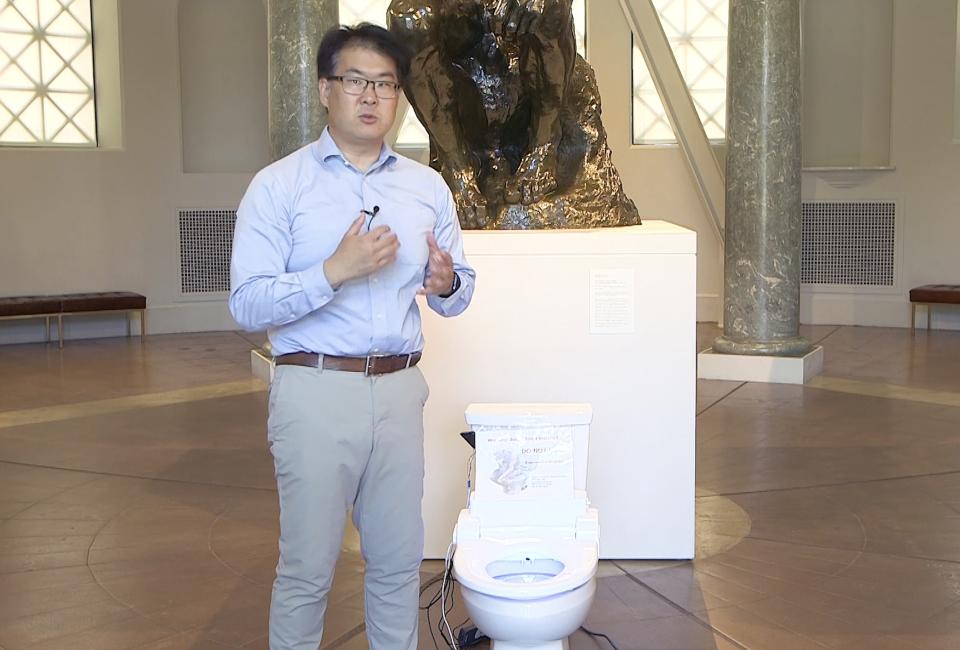‘Smart’ loo that identifies a person from ‘analprint’ wins spoof Ig Nobel prize
A “smart” toilet that can identify a person from their “analprint” has won one of this year’s spoof Ig Nobel prizes.
Just like fingerprints, the creases in the lining of a person’s anus – known as analprint – is said to be unique.
The toilet – developed by experts at Stanford University in the US – features cameras that take photos of a person’s bottom to analyse these distinctive creases.

However, the key aim of the Smart Healthcare Toilet is to look for signs of diseases by analysing stools and urine.
In addition to the anus, the cameras also take pictures of stools to look for tell-tale signs of cancer and other conditions such as irritable bowel syndrome.
The technology comes with test strips that can detect substances such as glucose and red blood cells in the urine, which are associated with various health issues.
Dr Seung-min Park, an instructor of urology at Stanford’s School of Medicine, who led the research, told the PA news agency, said: “Our bathrooms, often seen as the most private of spaces, have the potential to become the silent guardians of our health.
“The Smart Healthcare Toilet is our vision of the next frontier in healthcare, where preventive healthcare melds effortlessly into our daily routines.”
The toilet is among 10 other winners at the annual spoof awards for wacky science, which are supposed to “make us laugh but then make us think”.
The prize is awarded annually by the science humour magazine the Annals of Improbable Research.
Winners receive a 10 trillion dollar bill from Zimbabwe alongside a trophy.
Dr Park, who won the public health prize, described it as a “humbling experience”, which “serves as a tribute to the researchers, mentors, and visionaries who dare to seek answers in unconventional places”.
He told PA: “We might laugh at the thought of a Smart Healthcare Toilet today, but with this recognition, it becomes evident that the potential for positive health impact, even in our most private moments, is immense.”
Other awards at the virtual ceremony on Thursday included the medicine prize for using cadavers to explore whether there is an equal number of hairs in each of a person’s two nostrils, and the nutrition prize for experiments to determine how electrified chopsticks and drinking straws can change the taste of food.
The education award was scooped up by the research team studying the boredom of teachers and students.
Dr Wijnand Van Tilburg, an experimental social psychologist at the University of Essex, who was part of this team, said their studies showed “the mere expectation that classes will be boring caused students to feel bored”.
He said studying boredom is very important because it has been blamed for behaviours like lacking attention, loss of motivation, and even student drop outs.

Dr Van Tilburg told PA: “Beyond education, boredom is associated with poor mental health, such as depression and anxiety.
“To combat the negative outcomes of boredom, it is crucial to study it scientifically.
“This will help us answer questions such as who is likely to get bored and why, what the causes are of boredom, and what can we do to avoid (it).”
An international collaboration won the communication prize for studying the brains of people who are expert at speaking backwards, some of whom are able to rapidly reverse sentences of up to 12 words.
Dr Adolfo Garcia, of the Global Brain Health Institute in the US, told PA: “It all began when we learned that a famous Argentine photographer had this ability and was willing to have his brain scanned.
“We were intrigued by the oddity of the situation, but then became amazed at how proficient he was at reversing speech.”

He said their work gives insights into how the fundamental aspects of human language shape the brain.
The mechanical engineering award went to a team who re-animated dead spiders to use as them as mechanical gripping tools.
Faye Yap, a PhD student at Rice University in the US, said the findings, published in the journal Advanced Science, showed that spiders “are able to grasp objects greater than their own weight”, potentially opening the doors to a new area of robotics.
A study of the “unfamiliar or peculiar” sensations people feel when they repeat a single word many times was awarded the literature prize while the chemistry and geology gong went to Jan Zalasiewicz, emeritus professor of palaeobiology at the University of Leicester, for explaining why geologists like to lick rocks.
Prof Zalasiewicz, told PA: “These days field geologists sometimes lick rock samples they’ve collected before examining them with a hand lens, because it’s easier to see the mineral particles on a wet rock surface.
“A couple of centuries ago and more, though, some geologists had learnt to tell different rocks and minerals apart by their taste – that’s a skill we’ve now almost completely lost.”


